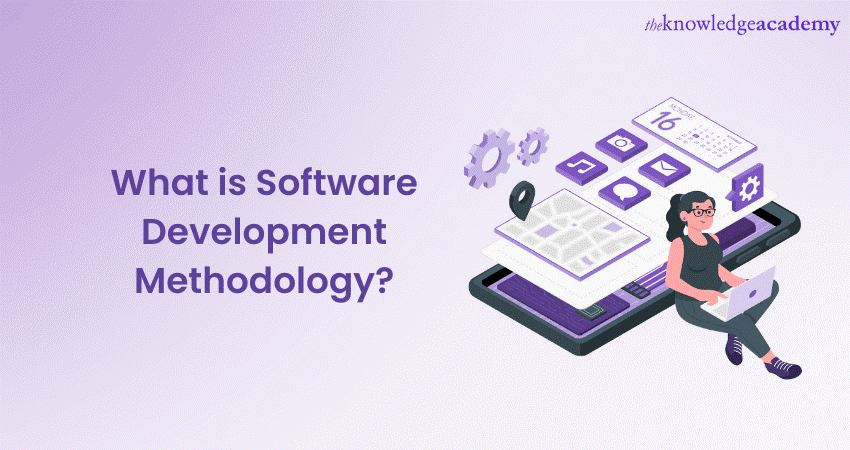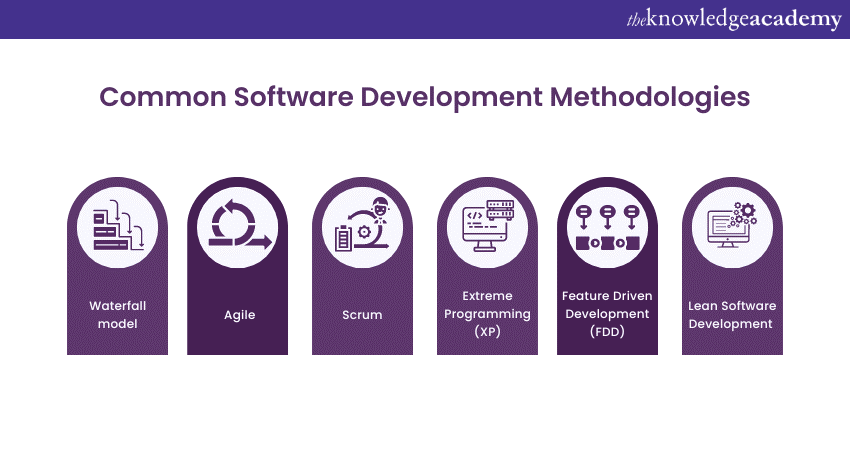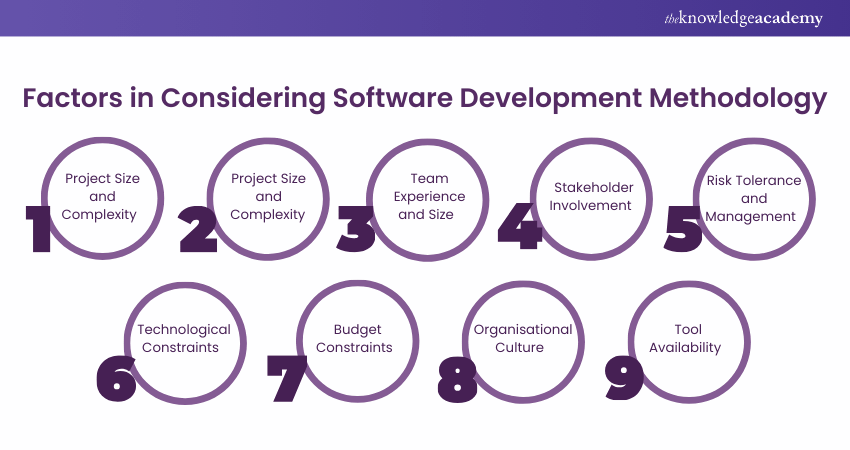We may not have the course you’re looking for. If you enquire or give us a call on 01344203999 and speak to our training experts, we may still be able to help with your training requirements.
We ensure quality, budget-alignment, and timely delivery by our expert instructors.

What is Software Development Methodology? Think of it as the game plan for crafting software that solves problems and delights users. The framework transforms big ideas into real-world solutions, guiding teams through every step of the journey—from brainstorming and coding to testing and launching.
Like a recipe for success, methodologies like Agile, Waterfall, Scrum, and DevOps offer tailored approaches to fit different projects and team dynamics.
Whether chasing innovation or refining the basics, the correct methodology ensures smooth collaboration, efficient workflows, and stellar results. In this deep dive, we’ll uncover the ins and outs of Software Development methodologies, exploring how they keep projects on track in a fast-paced, ever-changing tech landscape.
Table of Contents
1) Understanding What is Software Development Methodology
2) Common Software Development Methodologies
3) Importance of Methodologies in Software Development
4) Factors in considering Software Development Methodology
5) Conclusion
Understanding What is Software Development Methodology
A Software Development Methodology is a structured framework used to plan, manage, and execute the creation of information systems. It provides a roadmap for every stage of development—conceptualisation, requirement gathering, design, coding, testing, deployment, and maintenance.
Beyond technical aspects, these methodologies emphasise collaboration among developers, testers, project managers, and end-users to ensure the final product resonates with business objectives and user needs.
Methodologies introduce step-by-step procedures to ensure each phase is thoroughly addressed, enhancing software robustness, usability, and compliance with requirements.
There is no single approach; the choice depends on project complexity, timelines, and goals. Evolving with industry trends, these frameworks help identify risks early, promote consistency, and drive continuous improvement across projects.
Common Software Development Methodologies
Software Development is an intricate process that demands a strategic approach. Over the years, various Software Development Methodologies have emerged, providing unique frameworks and practices to ensure the delivery of efficient and high-quality software. Each methodology has been shaped by different underlying philosophies and objectives, making them suitable for various project needs. Let's have a look at some of them:

Waterfall Model
One of the earliest Software Development Methodologies, the Waterfall model, is characterised by its linear and sequential approach. Projects progress through predefined stages, including the following:
a) Requirement gathering
b) System design
c) Implementation
d) Integration
e) Testing, deployment
f) Maintenance
Each stage must be completed before the next begins. Its structured nature best suits projects with clearly defined requirements and minimal changes. However, its lack of flexibility is often considered a drawback, especially in projects where requirements evolve.
Agile
A sharp contrast to Waterfall is Agile. It promotes an iterative and incremental approach. It divides projects into small parts, treating each as a mini project. The essence of Agile lies in its adaptability and emphasis on collaboration and customer feedback.
This Software Development Methodology allows for frequent adjustments based on evolving requirements, ensuring the product remains aligned with user needs. However, effective implementation demands a steep learning curve and experienced teams.
Scrum
A subset of Agile, Scrum provides a structured framework using short, time-boxed cycles called sprints. With designated roles like the Scrum Master, Product Owner, and Development Team, it emphasises team collaboration and frequent feedback loops. Moreover, daily standups, sprint reviews, and retrospectives form its backbone. While Scrum enhances transparency and adaptability, it also necessitates strict adherence to its roles and ceremonies.
Extreme Programming (XP)
Prioritising technical excellence, XP is an Agile Software Development Methodology focusing on improving software quality. It advocates practices like pair programming, continuous integration, and test-driven development. By fostering close customer collaboration and regular adaptation of plans, XP ensures that the product always aligns with user expectations. However, its rigorous nature can be demanding for developers.
Feature Driven Development (FDD)
This model-driven approach emphasises developing and delivering individual features. Through developing an overall model and building by feature, FDD offers clear progress tracking and a structured development process. It can be particularly effective for large teams and projects, though it demands rigorous modelling expertise.
Lean Software Development
Deriving its principles from Lean manufacturing, this Software Development Methodology is about optimising efficiency. Lean Software Development aims to streamline the production process using the best available resources by focusing on eliminating waste and delivering fast. It's a transformative approach that may require shifts in traditional thinking, making it challenging at times to implement, especially in larger organisations.
Kanban
Originating from Japanese manufacturing, Kanban is about visual management and efficient workflow. It employs a board (physically or digitally) to visualise tasks and their progress through various stages, often "To Do", "In Progress", and "Done".
Kanban emphasises continuous delivery without overloading team members, allowing for flexibility and real-time communication. It's particularly well-suited for projects requiring constant priority shifts and can work in conjunction with other Methodologies like Agile.
Rapid Application Development (RAD)
RAD prioritises rapid prototyping over prolonged planning, making it adaptable to changes. By emphasising user involvement and a modular approach, RAD allows for iterative feedback and adjustments.
This Software Development Methodology is highly suitable for projects that need a working model quickly and can accommodate evolving requirements. The downside, however, might be a tendency to overlook deeper systemic issues in the software due to the rapid pace.
Spiral Model
Combining elements from the Waterfall and Iterative models, the Spiral model emphasises risk analysis. Projects evolve in a spiral manner, repeatedly going through planning, risk assessment, engineering, and evaluation phases. This constant looping ensures that risks are identified early and solutions are refined progressively. While the Spiral model provides a balanced approach, it can be resource-intensive due to its continuous evaluation and iteration.
Learn how a product is created, implemented and used; sign up for our Software Engineering Training now!
Importance of Methodologies in Software Development
Software Development Methodologies play a pivotal role in shaping the course of creating digital solutions. At a glance, they might seem like rigid frameworks or mere formalities, but their importance is multi-faceted and deeply entrenched in the success of software projects. Here's why these methodologies are crucial:
a) Structural Framework: At the heart of any Software Development Project is a maze of tasks, responsibilities, and objectives. Methodologies provide a structural framework, ensuring that every stage of the Software Development process is meticulously planned and executed. This organised approach minimises errors, enhances efficiency, and fosters consistency.
b) Risk Management: Software projects, irrespective of their scale, are fraught with risks - from evolving requirements and technological challenges to team dynamics. Methodologies, especially iterative ones like the spiral model, embed risk assessment into their process, enabling early identification and mitigation of potential pitfalls.
c) Quality Assurance: Maintaining consistent quality becomes a challenge without a standardised Software Development Methodology. Methodologies lay down processes, standards, and best practices that ensure the software meets the desired quality benchmarks in terms of functionality, performance, security, or user experience.
d) Efficient Resource Utilisation: Resources, whether time, human capital, or finances, are always limited. Methodologies guide the optimal allocation and utilisation of these resources. They ensure that projects are finished within budget and timelines without compromising on quality.
e) Stakeholder Communication and Collaboration: Clear communication and collaboration among stakeholders are emphasised as crucial aspects in most Methodologies. Regular check-ins, feedback loops, and reviews ensure that everyone, from developers and testers to clients and end-users, stays aligned with the project's objectives and progress.
f) Adaptability: Today, users' needs and market dynamics are constantly evolving; thus, being adaptable is key. Agile Methodologies, for instance, allow teams to pivot based on feedback, ensuring the end product remains relevant and valuable.
Factors in Considering Software Development Methodology
Selecting a suitable Software Development Methodology can be crucial to the success of a project. It dictates how a team approaches the entire development lifecycle, influencing efficiency, collaboration, and the final product quality. Software Development Career often require knowledge of various methodologies to adapt to different project needs. Given its significance, here are essential factors to mull over when choosing a methodology:

Project Size and Complexity
Some methodologies are better suited for large, complex projects, while others are ideal for smaller, more focused undertakings. For instance, the Waterfall model might be apt for well-defined, static projects, whereas Agile is more fitting for complex projects with evolving requirements.
Project Duration and Deadlines
If you're working against tight deadlines or need frequent releases, Software Development Methodologies that support rapid iterations, such as Agile or RAD, might be beneficial. Longer projects with phased deliverables might opt for Waterfall or Spiral models.
Team Experience and Size
The expertise and size of your development team can influence methodology choice. For instance, Agile requires experienced teams well-versed in its practices, while the Waterfall model can be more forgiving for less experienced teams. Additionally, certain methodologies work better for larger teams and vice versa.
Stakeholder Involvement
Projects that require frequent feedback and close collaboration with stakeholders might benefit from Agile or Scrum, where regular check-ins and reviews are integral. Conversely, if stakeholders prefer a hands-off approach, a model like Waterfall might be more appropriate.
Risk Tolerance and Management
If a project has significant unknowns or high risks, the Spiral model, emphasising risk assessment, can be a wise choice. On the other hand, projects with well-defined requirements and low risks might lean towards the Waterfall or FDD models.
Technological Constraints
Some projects, especially those involving emerging or rapidly changing technologies, might benefit from adaptive Methodologies that accommodate regular tech updates. Others, rooted in established tech stacks, can opt for more sequential approaches.
Budget Constraints
Budget can influence how flexible and adaptive you can be. Fixed budget projects might lean towards Methodologies with clear stages and deliverables, like Waterfall, ensuring cost predictability. More flexible budgets allow for iterative and adaptive Methodologies like Agile.
Organisational Culture
The prevailing culture of an organisation plays a role too. Organisations with a culture of flexibility, innovation, and collaboration might find Agile Methodologies more resonant, while those rooted in hierarchical, structured environments might prefer Methodologies like Waterfall.
Tool Availability
The tools and platforms vailable or used by an organisation can influence methodology choice. Some Methodologies have specific tools that facilitate their practices, and if an organisation already has such tools in place, it might be logical to adopt that methodology.
Conclusion
Understanding What is Software Development Methodology is crucial for any project's success. These methodologies provide structured blueprints for creating software, ensuring its quality, and meeting stakeholder expectations. Their thoughtful application bridges the gap from an idea's conception to its successful real-world deployment.
Learn to choose an accurate programming language for excellent outcomes; sign up for our Software Design And Architecture Training now!
Frequently Asked Questions
Which Software Development Methodology Follows a Linear Approach?

The Waterfall methodology follows a linear approach, progressing sequentially through phases like requirement gathering, design, development, testing, and deployment without overlapping or revisiting earlier stages.
What is the Most Flexible Software Development Methodology?

The Agile methodology is the most flexible, facilitating iterative development, adaptability to varying requirements, and continuous collaboration between teams and stakeholders.
What are the Other Resources and Offers Provided by The Knowledge Academy?

The Knowledge Academy takes global learning to new heights, offering over 3,000 online courses across 490+ locations in 190+ countries. This expansive reach ensures accessibility and convenience for learners worldwide.
Alongside our diverse Online Course Catalogue, encompassing 19 major categories, we go the extra mile by providing a plethora of free educational Online Resources like News updates, Blogs, videos, webinars, and interview questions. Tailoring learning experiences further, professionals can maximise value with customisable Course Bundles of TKA.
What is the Knowledge Pass, and how Does it Work?

The Knowledge Academy’s Knowledge Pass, a prepaid voucher, adds another layer of flexibility, allowing course bookings over a 12-month period. Join us on a journey where education knows no bounds.
What are related courses and blogs provided by The Knowledge Academy?

The Knowledge Academy offers various Software Engineering Courses, including Software Development Lifecycle Training, Systems Development Essentials Training, Agile Leadership Training. These courses cater to different skill levels, providing comprehensive insights into Regex.
Our Programming & DevOps Blogs cover a range of topics related to Leadership, offering valuable resources, best practices, and industry insights. Whether you are a beginner or looking to advance your Programming skills, The Knowledge Academy's diverse courses and informative blogs have got you covered.






 Top Rated Course
Top Rated Course




 If you wish to make any changes to your course, please
If you wish to make any changes to your course, please


